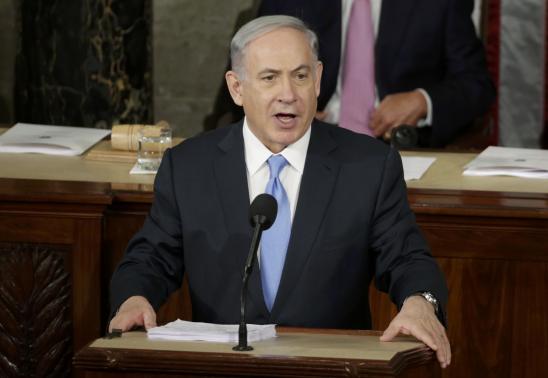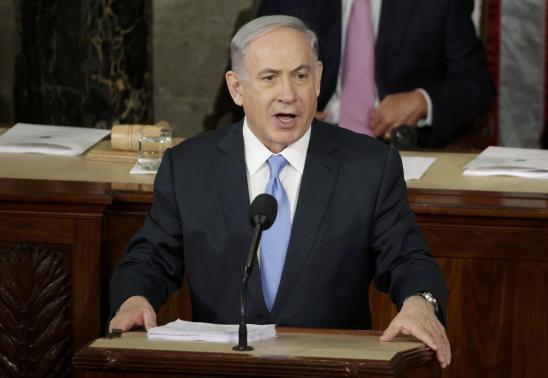 Israeli Prime Minister Benjamin Netanyahu addresses a joint meeting of Congress in the House Chamber on Capitol Hill, March 3, 2015.
Israeli Prime Minister Benjamin Netanyahu addresses a joint meeting of Congress in the House Chamber on Capitol Hill, March 3, 2015.CREDIT: REUTERS/GARY CAMERON[/caption]
So it finally happened. After weeks of�acrimony and politicking, Israeli Prime Minister Benjamin Netanyahu delivered his speech before Congress. You can follow The Washington Post's full�coverage of the event�here.
Netanyahu spoke along the script�most anticipated, inveighing against the existential threat that would be posed to Israel by an Iran with nuclear weapons and calling out the perfidy of the regime in Tehran. He insisted that there was little difference between the rulers of the Islamic Republic and the militants of the Islamic State.
"Iran and [the Islamic State]�are competing for the crown of militant Islam. One calls itself the Islamic Republic. The other calls itself the Islamic State," Netanyahu�said. "Both want to impose a militant Islamic empire first on the region and then on the entire world. They just disagree among themselves who will be the ruler of that empire."
The Israeli leader went on to dismiss the fact that Shiite-led Iran is on the front lines of the battle against the Sunni extremists. "When it comes to Iran and [the Islamic State], the enemy of your enemy is your enemy," Netanyahu�said.
There are instances�when this sort of�moral clarity can�be useful�� say, when the United States backed anti-Soviet�militants who would eventually form the ranks of the Taliban and al-Qaeda. And�it's not the first time that Netanyahu�� known for his prolific and sometimes dubious�use of historical metaphors�� has likened the Islamic State jihadists to his own more immediate enemies.
Netanyahu: �Don't be fooled� on Iran and Islamic State(1:38)
Speaking to Congress, Israeli Prime Minister Benjamin Netanyahu said the Iranian regime will always be an enemy of the U.S. and its battle against Islamic State does not change that. (Reuters)
At the U.N. General Assembly last year, Netanyahu�complained�that world leaders "evidently don�t understand that [the Islamic State]�and Hamas are branches of the same poisonous tree." He was referring to the Palestinian Islamist group entrenched in the Gaza Strip, a territory�Israel pummeled with airstrikes last summer in its campaign against rocket-firing militants.
In his speech to Congress, Netanyahu described�Iran's supposed "march of conquest, subjugation and terror"�� the inroads that�militant groups with suspected ties to Tehran have made in countries such as Lebanon, Syria, Iraq and Yemen. His contention is�that the Islamic Republic, like the Islamic State, is bent on a "medievalist" bloodbath and that it can't be reasoned with like a "normal" state actor.
This�is stirring�Churchillian rhetoric, perhaps, but it does not�stand up to scrutiny. Without getting bogged down in the parallel debate over�the agenda of the Islamic State, let's look at why Netanyahu's analogy�obscures far more than it reveals.
There are obvious and important differences between Iran�and the Islamic State�� even beyond the simple fact that the former is a country of 80 million people whose government is desperately�trying to destroy�the latter, an extremist, criminal organization buoyed by ranks of foreign fighters.
Iran's theocratic rulers are hardly champions�of�religious pluralism and tolerance, but they�are not crazed fundamentalist jihadists, bent on smashing idols and�butchering religious minorities. There are�long-standing communities of Christians and Jews�in the country, who are�better protected in Iran than they�would be in other parts of the region.
As flawed as it may be, the regime's democracy is more genuine and competitive�than what�one finds�in a host of other Arab states that stir far less outrage from Netanyahu.�Critics of Tehran say its elected leaders, including "moderate" President Hassan Rouhani, are ciphers for Supreme Leader Ali Khamenei. Even so, the�heated battles�within Iran over its negotiations with the West present�a clear sign of the complexity of its politics.
Netanyahu may see�the Islamic Republic as a wholly ideological entity, consumed by its own zeal.�But that reading has been contradicted�over�andover�again by other voices within Israel, including prominent figures in the country's security establishment, who consider Iran's leadership to be "rational." That's�an assessment�shared by successive U.S. administrations as well.
And what about Iran's "march of conquest," as Netanyahu put it? Well, the more honest reading of that would center squarely on Iran's need for proxies in its long-running regional Cold War with Saudi Arabia and, to a lesser extent, other Persian Gulf states, as�Peter Beinart observes:
Supporting Hezbollah gives Iran a power base in Lebanon; supporting Hamas (which also�enjoys backing�from Turkey and Qatar) gives it influence among the Palestinians; supporting Bashar al-Assad safeguards a reliable ally in Syria; supporting the Houthis expands Tehran�s influence in Yemen.
None of this may be very nice or good for the Middle East, but it hardly suggests that Iran is not worthy of diplomacy�� at least, no less�so�than the Saudis, a favored ally of the West.
It's also worth pointing out what has enabled Iran's considerable geopolitical gains in the region, particularly in neighboring Iraq. The U.S. invasion in 2003 ousted a staunchly anti-Iranian regime run by dictator Saddam Hussein. The�roots of the Islamic State�date back to the chaos that was unleashed in the aftermath.
Moreover, in the vacuum, Shiite political parties came to dominate Baghdad, and Tehran's influence grew. As my colleague Liz Sly observed recently, at the spot in Baghdad where there was once�a famous statue�of Saddam Hussein, there is now a poster of the Iranian supreme leader.
Ahead of the U.S. invasion, Netanyahu had delivered testimony to Congress in 2002 proving that he's perhaps not the most�clear-eyed observer�of Middle Eastern affairs.
"I guarantee you that [removing Saddam Hussein] will have enormous positive reverberations on the region," he said.
By The Washington Post











